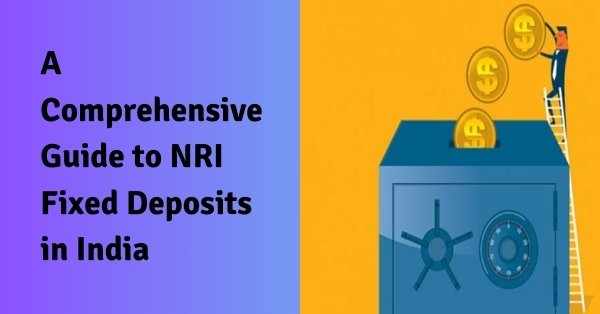As a Non-Resident Indian (NRI), you might be looking for ways to invest your money back home. One popular and safe option is an NRI Fixed Deposit (FD). This guide will help you understand what NRI FDs are, how they work, and why they might be a good choice for you.
What is an NRI Fixed Deposit?
An NRI Fixed Deposit is a type of savings account offered by Indian banks to Non-Resident Indians. When you put money in an FD, you agree to leave it there for a set time. In return, the bank pays you interest on your money. It’s like lending your money to the bank, and they pay you for it.
Types of NRI Fixed Deposit Accounts
There are two main types of NRI Fixed Deposit accounts. The first is the NRE (Non-Resident External) Fixed Deposit. This is for the money you earn outside India and bring into the country. The interest you earn on this deposit is tax-free in India, and you can freely send both the deposit amount and the interest back to your country of residence.
The second type is the NRO (Non-Resident Ordinary) Fixed Deposit. This is for the money you earn in India, like rent from a property you own. The interest on this deposit is taxable in India, and there are some restrictions on sending the money abroad.
Why Choose an NRI Fixed Deposit?
NRI Fixed Deposits offer several benefits that make them an attractive investment option. First and foremost, they are very safe because they’re backed by the bank. Even if something goes wrong with the bank, the Indian government insures deposits up to a certain amount. This safety net provides peace of mind for many investors.
Another advantage of FDs is that they offer guaranteed returns. Unlike some other investments where returns can go up and down, FDs give you a fixed interest rate. You know exactly how much you’ll earn when you make the deposit. This predictability can be very helpful for financial planning.
FDs also offer flexibility in terms of how long you want to invest. You can choose how long you want to keep your money in the FD, from a few months to several years. Generally, longer terms offer higher interest rates, allowing you to maximize your returns if you can commit your money for a longer period.
One of the most appealing aspects of NRI Fixed Deposits, particularly NRE FDs, is the tax benefit. For NRE FDs, the interest you earn is tax-free in India. However, it’s important to note that you might need to pay taxes in your country of residence, so it’s a good idea to check with a tax advisor.
Lastly, FDs are easy to understand. You don’t need to keep track of market changes or make complex decisions. This simplicity makes them accessible to investors who may not have the time or expertise to manage more complex investments.
How to Open an NRI Fixed Deposit?
Opening an NRI Fixed Deposit is a relatively straightforward process. The first step is to choose a bank. Look for banks that offer good interest rates and have a strong reputation. Many Indian banks have special NRI services, which can make the process easier.
Next, you’ll need to gather the necessary documents. Typically, you’ll need proof of your NRI status (like a copy of your passport), proof of address in your country of residence, and a photograph. It’s a good idea to check with your chosen bank for their specific requirements.
Before you can open an FD, you’ll need to have an NRE or NRO savings account. Choose based on the source of your funds (foreign earnings for NRE, Indian earnings for NRO). If you don’t already have one, you’ll need to open this account first.
Once you have your savings account, you can complete the FD application form. Many banks now allow you to do this online, making it convenient even if you’re not in India. After your application is approved, you can fund the account by transferring money from your NRE or NRO savings account to open the FD.
Interest Rates and Taxation
Interest rates for NRI FDs are usually slightly higher than those for resident Indian FDs. Rates can vary between banks and change over time, so it’s worth shopping around to find the best deal. Some banks also offer special rates for senior citizens, so if you’re over 60, be sure to ask about this.
When it comes to taxation, NRE and NRO FDs are treated differently. For NRE FDs, the interest you earn is tax-free in India. This can make them a very attractive option for NRIs looking to maximize their returns.
For NRO FDs, on the other hand, the bank will deduct tax at source (TDS) from your interest earnings. The current TDS rate for NRIs is 30%, but this can be lower if your country has a tax treaty with India. It’s important to note that even if your interest is tax-free in India, you might need to pay taxes on it in your country of residence. Always consult with a tax advisor who understands both Indian tax laws and the tax laws of your country of residence to get a clear picture of your tax obligations.
Renewing and Closing Your NRI Fixed Deposit
When your FD reaches its maturity date, you have a few options. Many banks offer automatic renewal, where the FD will be renewed for the same term at the current interest rate. This can be convenient if you want to continue your investment without any action on your part.
Alternatively, you can choose to withdraw the money. In this case, you can transfer the funds back to your NRE or NRO savings account. This might be a good option if you need the money or if you want to explore other investment opportunities.
You also have the option to change the terms of your FD when you renew. You might choose to renew for a different term or amount, depending on your current financial needs and goals.
If you need your money before the FD matures, most banks allow early withdrawal. However, it’s important to note that you might earn a lower interest rate if you do this. The exact penalty for early withdrawal varies by bank, so be sure to check the terms and conditions when you open your FD.
Things to Consider
While NRI Fixed Deposits are generally a safe and simple investment, there are a few things to keep in mind. If you plan to eventually convert your money back to your home currency, changes in exchange rates could affect its value. This exchange rate risk is something to consider, especially for long-term deposits.
Another factor to consider is interest rate changes. Once you’ve locked in an FD, you can’t take advantage of higher rates if they go up. On the flip side, your rate is protected if rates go down. This is why some investors choose to “ladder” their FDs, spreading their money across multiple FDs with different maturity dates.
It’s also important to consider inflation. Make sure the interest rate you’re earning is higher than the inflation rate in India. Otherwise, your money might lose value over time in real terms.
Lastly, while deposits are insured, it’s still a good idea to choose a reputable, financially sound bank. Research the bank’s financial health and customer service reputation before you invest.
Conclusion
NRI Fixed Deposits can be a great way to save and grow your money in India. They offer safety, guaranteed returns, and tax benefits for NRE deposits. However, like any financial decision, it’s important to consider your overall financial goals and situation. Consider talking to a financial planner who specializes in NRI investments to see if FDs are the right choice for you.
FAQs
- Can all NRIs open Fixed Deposits in India?
Ans- Yes, most NRIs can open FDs. You need to be an Indian citizen or a Person of Indian Origin (PIO) living abroad. - What’s the minimum amount needed to open an NRI Fixed Deposit?
Ans- This varies by bank, but many allow you to start with as little as ₹10,000. - Can I open an NRI Fixed Deposit online?
Ans- Many banks now offer online NRI FD openings. You’ll need to have an NRE or NRO savings account with the bank first. - What happens to my NRI Fixed Deposit if I return to India permanently?
Ans- You can continue your FD, but you’ll need to inform the bank about your change in residential status. The FD will be converted to a resident FD when it’s renewed. - Can I get a loan against my NRI Fixed Deposit?
Ans- Yes, many banks offer loans against NRI FDs. The loan amount is usually a percentage of your FD value. - What’s the maximum term for an NRI Fixed Deposit?
Ans- This varies by bank, but many offer terms up to 10 years. - Can I nominate someone for my NRI Fixed Deposit?
Ans- Yes, you can nominate a resident Indian or another NRI as the beneficiary of your FD. - Are NRI Fixed Deposits covered by deposit insurance?
Ans- Yes, in India, deposits up to ₹5 lakhs (including principal and interest) per bank are insured by the Deposit Insurance and Credit Guarantee Corporation (DICGC). - Can I open a joint NRI Fixed Deposit?
Ans- Yes, you can open a joint NRI FD with another NRI or a resident Indian. However, the first account holder must be an NRI. - How is interest paid on NRI Fixed Deposits?
Ans- Interest is usually paid at maturity for short-term FDs. For longer-term FDs, you can often choose to receive interest payments monthly, quarterly, or annually.
Disclaimer: The information provided here is for educational and informational purposes only and should not be construed as financial, legal, or tax advice. Consult with a qualified professional before making any investment decisions. We do not accept any liability for errors or omissions in this information nor any direct, indirect, or consequential losses arising from its use.





